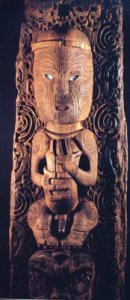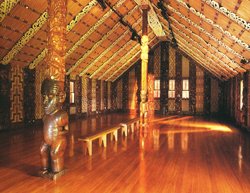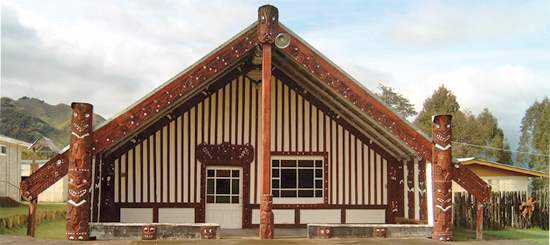|
Search
|
Most Popular

Tahuhu (Ridge Pole)
Ngati Awa
While Western notions separate "human" from "inanimate" worlds, indigenous peoples almost uniformly see them as connected.
In Maori culture, for instance, the Whare Nui or Meeting House, which forms the centre of Maori social, cultural and spiritual existence is seen as an ancestor - not, as some have suggested as like an ancestor, but as the actual embodiment of the iwi (tribal), hapu (sub-tribal) or whanau (family) ancestor in which the ridge beam (tahuhu) is the spine, the rafters (heke) are the ribs, the carved figure at the ridge (tekoteko) is the head, and the bargeboards (maihi) sloping down from the tekoteko are the arms.

Amo (bargeboard support), Ngati Awa, Pukeko Marae, Poroporo.
A Marae Visit
Wharenui, Ruatahuna, Urewera
While the Cultural Performances are very worthwhile and will give the perceptive traveller a snapshot overview of Maori culture, a visit (and overnight stay) at a Marae can be an unforgettable experience.
Here, you will hear the undiluted stories of Maori, experience and history from the people first-hand in an intimate setting. You will be exposed to the living protocols of everyday Maori life, and will learn by experience the ceremonial system of the Marae.
 The Gathering
The Gathering
Those who are to participate in a Marae visit will normally be asked to meet and congregate outside the waharoa (gate) to the Marae at a specific time. It is customary for those entering together to greet each other with a handshake or a hongi, prior to the call to enter.
At this time, a decision will be made on who is to speak for the group during the ceremony, and the order of speaking will also be decided. The one who is chosen to speak last will usually collect a koha (usually a small financial gift to defray the host’s expenses).
At some point, a member of the group will indicate to the hosts (who are gathered waiting outside the Wharenui) that the visitor group is ready to enter.
Karanga
The visitors will be called on to the Marae from the gate by a female elder chanting a karanga. Following this, their group will cross the Marae Atea with the women in the group leading the way.
They will pause mid-way and stand for a few moments in silence to honour and remember the ancestors – both host’s and visitor’s - who have passed away.
Then they move forward, awaiting an indication to take their seats to listen to (and perhaps participate in) the whaikorero.
Whaikorero
Visitors may be asked not to speak in English during the whaikorero. but to speak only in te reo Maori. This is not intended to offend, The Marae Atea where the whaikorero takes place is a sacred or tapu place. It is also the one place where the struggle to preserve the Maori language has been waged for generations. Respect for this struggle is important. If you and your group are accompanied by a Maori then they will usually speak on your behalf.
Koha
It is traditional, at the end of the last speech, for the last visiting speaker to place the koha on the ground as a financial contribution to the cost of housing and feeding the visiting group. Following this you will be expected to line up for a “hongi line”, where you will move forward and hongi (press noses) with your hosts. Having completed this ceremony you will be directed to the wharekai and offered kai, (a snack, cup of tea etc.).
Dining
All eating is preceded by the blessing of the food with a ritual karakia. Be careful not to inadvertently sit on a table – this is deeply offensive. After eating, you will proceed to the Wharenui for introductions and discussion.
Te Take: The Meeting
Every Marae visit has a take – a reason for happening. Gathering inside the Wharenui is now where the purpose of the gathering is revealed and pursued. You will be expected to take off your shoes before entering the wharenui. The hosts will speak first, introducing themselves and welcoming you, and the pattern of introductions will move clockwise around the room until it reaches you. You may speak for as long as you wish without fear of interruption.
Speaking Maori language on the Marae is traditional, and even a small attempt will be highly valued, but English or other first languages are acceptable in the case of the tourist. You will be expected to introduce yourself and to say where you are from and what kinds of interests you have. After this you will be expected to sing a waiata which can be in your own language. Especially valued are the stories and songs of other indigenous peoples – Welsh, Scottish, Irish, Saami, Native American etc. But the tradition of manaakitanga will ensure that in whatever language you speak and whatever you say, you will feel supported and appreciated.
 Overnight Stay
Overnight Stay
Cultural Tourism visits to a Marae sometimes involve an overnight stay. This involves sleeping Marae-style in the Wharenui – that is, sleeping on mattresses on the floor set up in a circle around the walls.
All bedding will be provided. You will sleep with your head closest to the wall with your overnight bag and clothing at your feet.
Generally speaking, it is sensitive to be discrete about changing into sleeping wear – changing from your day clothes under a blanket. There are two codes that should be remembered. Never sit on your pillow, and never step over someone who is lying down.
Often, discussion continues long into the night, with people occasionally dropping off to sleep while listening. Don’t be embarrassed about this. Like many ofher cultures, Maori believe that the mind is particularly open and receptive in that state between being awake and asleep.
Sleep is often followed by an early morning karakia, followed by breakfast (more food blessing) which is followed by a poroporoaki (farewell ceremony). This involves more speeches (followed in each case by waiata) thanking the hosts, and especially the ringawera (literally “hot hands”) – those who have worked in the kitchen to prepare the food etc.
Intimidating and scary as it all sounds (and feels the first time) to be participating in another cultures sacred rituals, a Marae stay will undoubtedly be one of the major highlights of your visit.
Have a look at our glossary of Maori words and phrases.


